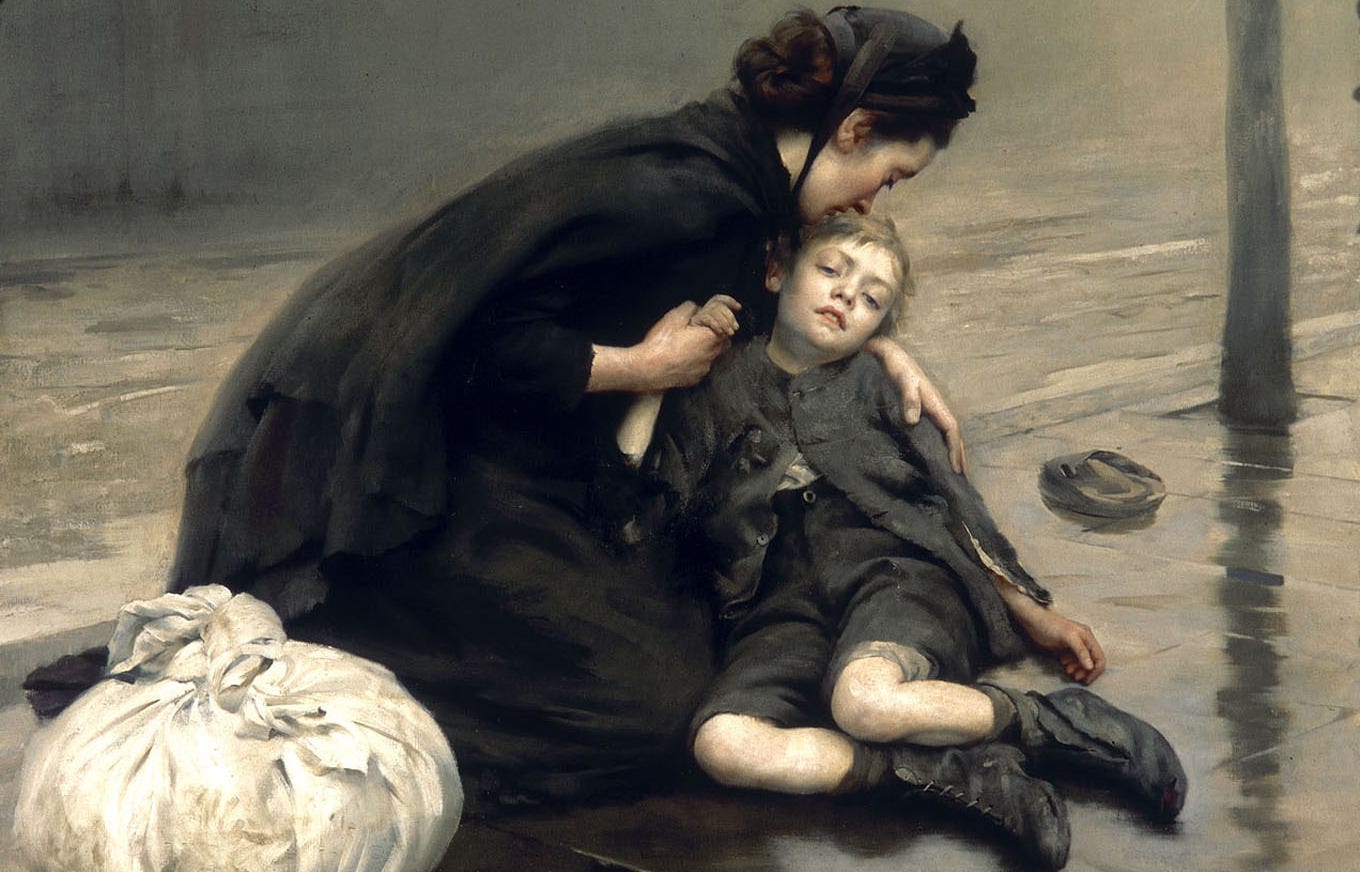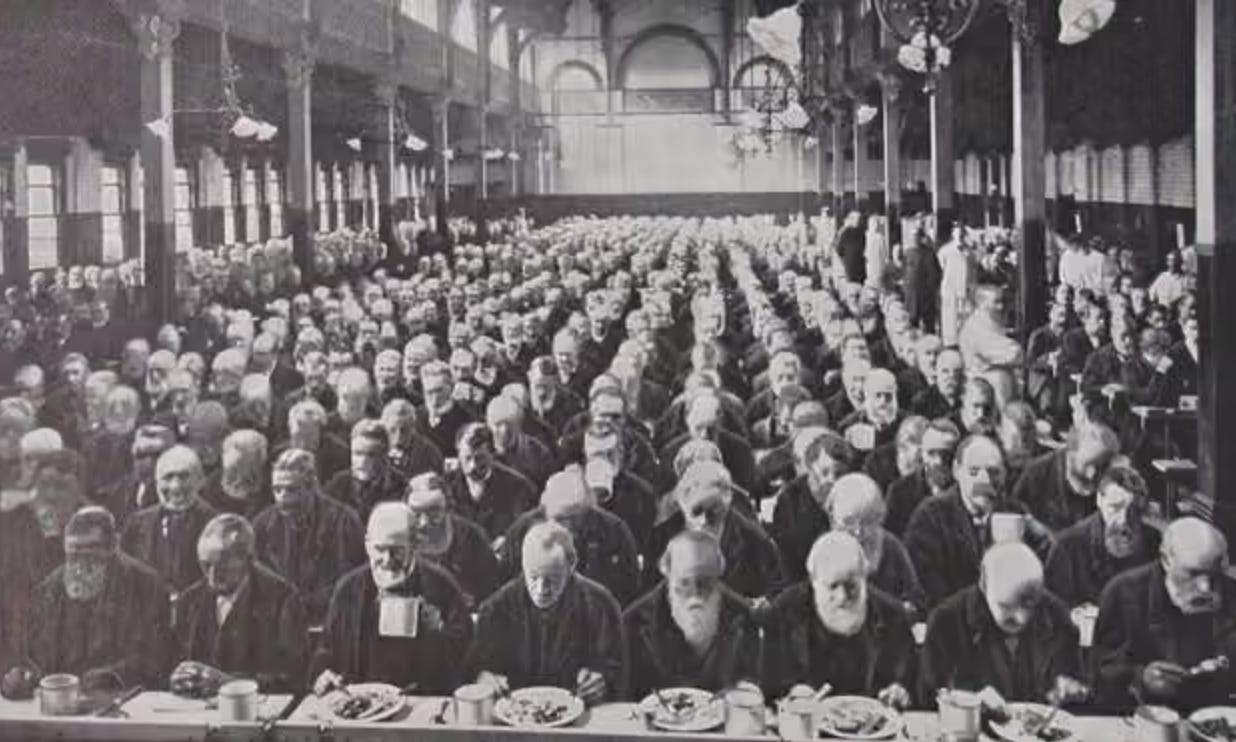Should we just give cash to the homeless?
A new charity is tackling homelessness with a simple approach. Does it work?
What would happen if evidence-based solutions to tackle the scourge of homelessness were separated from the moralizing condemnation of society?
That’s a question being explored by an admirable charity, Greater Change, which may have unlocked a scalable strategy for reducing homelessness, alleviating avoidable misery, and saving money all at once. But it requires a paradigm shift—and a departure from historic attitudes.
I: Roads to Nowhere
In 1860, Charles Dickens, unable to sleep, went for a nighttime wander through the streets of Victorian London. He trudged through sprawling human despair, endless pools of what he called “houselessness,” teeming with “Vice and Misfortune of all kinds,” walking tragedies that remained out of sight in the darkness.
Dickens, who had written Oliver Twist in response to the callous Poor Laws of 1834, predominantly recognized damaged humanity in those encounters. They were avoidable social tragedies, not depraved semi-human cancers to be excised.
And yet, the history of destitution, poverty, and homelessness is predominantly a moralizing history, in which what Dickens called the “houseless wanderers” are seen to deserve their plight—and must be carefully tucked away from respectable society.
Thomas Carlyle, best known for popularizing the Great Man theory of history, wrote in praise of harsh attitudes toward the poor: “If the lazy and improvident die of hunger, it is their own doing. The workhouse is mercy enough.” This perspective, which Dickens captures in Scrooge’s infamous remark (“Are there no prisons? Are there no workhouses?”) is the dominant conception of poverty throughout much of the post-Industrial era.
During this period, London’s poor would try to gather four pennies per day for the luxurious privilege of spending the night inside wooden coffins, densely packed in endless rows. (This was superior to being able to partly lie down, supported by a rope, for two pennies, or sitting upright on a bench for one.)
William Nassau Senior, an architect of the Poor Laws, saw poverty as laziness: “To give relief to able-bodied persons except in return for work is to offer a bounty on idleness and vice.” Such attitudes help explain disastrous government policies, such as the Irish “famine roads,” which were forged by those on the brink of starvation during a series of famines in the mid-nineteenth century. Many of them went literally nowhere, purposeless work aimed at extracting labor in exchange for miserly quantities of food, toil without meaning as a mechanism to “earn” one’s continued survival.
More recently, Margaret Thatcher once implied that poverty was a “personality defect.”
Offshoots of these attitudes persist. In modern America, three-quarters of Republicans and just under half of Democrats place a substantial share of the blame on homeless people themselves, saying that their own personal choices are a major factor.1 Far fewer Republicans—below half—think that a lack of affordable housing is a major cause; even lower numbers chalk the problem up to structural social problems or faultless victimhood, such as domestic abuse, joblessness, or poor health.
These divides—exacerbated by partisan identification—reveal a profoundly misguided view of what politics is for. In practice, politics works like this: rival partisans argue, without much reference to evidence, about what a social problem is caused by and who the good people and bad people are in their preferred narrative. Then, they adopt policies that reflect those prior beliefs, without much reference to evidence, arguing what will and will not work.
Consider how we make laws. It’s bizarre. Most government policies remain based on hunches, what lawmakers say will work, rather than by testing various options to verify what works best. No experiments done, no evidence required.2 We then vote for one conception of reality filtered through ideology, without much reference to evidence. Whoever wins gets a shot to play with people’s lives for four or five years, and then we do it all over again.
Greater Change, a social start-up aiming to reduce homelessness in Britain, has adopted a simpler strategy: leave the moralizing gaze of pundits and preachers to the side and simply give homeless people—or those about to become homeless—the cash they need to escape its grip.
This is, in many ways, the opposite of the dominant public view of homelessness: that giving struggling people cash will only feed the internal beast causing all the suffering, thereby worsening their already dire situation.
But the question that Greater Change cares about isn’t about blame or who “deserves” what; instead, they are guided by answering just one question:
Does giving cash to homeless people work?
II: A £700 Road to Nowhere
In 2018, Leigh Midwinter was struggling. He was running low on money, plagued by mental health problems, and desperate to see his children, who lived more than an hour away with their mother, his ex-wife. But there was a silver lining: he had a stable place to stay—a council flat that aimed to provide affordable housing to those who needed it.
Then, a trigger arrived: one month, he couldn’t come up with the £700 rent payment (the equivalent of about $930). As Samira Shackle wrote in The Prospect, this was the beginning of a profound unravelling for Midwinter:
He got back on track for subsequent payments but couldn’t repay the missed month. The council took him to court to pursue it. Midwinter became liable for the court costs. What had started as £700 was now over £2,000 of debt. With no way of paying, Midwinter was evicted. “It started the whole chain of homelessness,” he says. “I just lost hope.”
…After being evicted, Midwinter was placed in a multiple-occupancy house in the Tredworth area of Gloucester. He ended up staying there for three long and distressing years, costing the council tens of thousands of pounds—all to recoup a rent payment of around £700.
…Midwinter’s three years stranded in temporary accommodation were dark. He was afraid of the other occupants and spent a lot of time in his room. Scared to use the communal kitchen, he ate convenience foods that didn’t require preparation, and ultimately developed malnutrition, which has left him with long-term health issues. The mental health problems that had set this train of events in motion worsened. He was desperate to move back to Oxfordshire to be close to his children, but found himself stuck in a bureaucratic gap between different local authorities. On top of this, he couldn’t get onto the waiting list for council housing because of his outstanding rent arrears.
This Kafka-esque struggle, where lacking a reasonably small amount of money can lead to a bureaucratic nightmare of spiraling debts, homelessness, and mental devastation, is far too common. In Midwinter’s case, he fought hard for years to turn his life around—and eventually spotted the perfect low-income housing opportunity in Oxford, near his children. Suddenly, everything was falling into place; he could see the light at the end of the tunnel.
Then, Shackle noted, it looked like it was all going to fall apart again. The only way to secure that little slice of affordable housing was with the first month’s rent and a deposit upfront, which cost £1,200. Midwinter didn’t have the cash. But until the Council was paid, there would be no keys. They were at an impasse.
Thankfully, this story has a happy ending—and the first, fresh new chapter was written by Greater Change, a start-up founded by Oxford graduate and social entrepreneur Jonathan Tan. Through donors, they raised the money to simply transfer the necessary payment to the Council directly, giving Midwinter a chance to start a new life. He soon moved in, leaving homelessness permanently behind him.
In another instance, a mother of three faced eviction because her landlord’s property was being repossessed. She couldn’t afford the unexpected financial burden of temporarily storing her family’s possessions in a storage unit, nor of a property search and the associated moving costs.
Those challenges felt even more impossible as she was searching for jobs at the same time, hoping to provide a better life for herself and her kids. Greater Change kicked in £780, directly paying for storage and moving costs, breaking the chain of events that could have otherwise rapidly spiraled into homelessness.
For Tan, the lesson of these stories is obvious. How much suffering could have been avoided if Midwinter had just had that £700 back in 2018? And just how much government spending is wasted on coping with homelessness rather than preventing it in the first place, when it’s cheapest to solve?
III: Greater Change
Compared to the United Kingdom, there are far more “rough sleepers” in the United States, with hundreds of thousands of unfortunate people in American cities relegated to living in harsh conditions on the streets. Various estimates in the UK suggest that around 5,000 people in Britain are sleeping on the streets on any given night.
However, when you take into account people in temporary accommodation, the United Kingdom is one of the worst countries in the world for precarious housing, with more than 123,000 households living in temporary shelters, temporary flats, B&Bs, or hotels. Governments spent an estimated £2.1 billion ($2.8 billion) in the UK in the 2023-24 fiscal year for that temporary accommodation (with costs continuing to rise year after year).
Meanwhile, this funding for temporary accommodation—for homeless people and for asylum seekers alike—is making the slum landlords who provide it immensely rich, with hundreds of millions in profits.
This is the worst of every possible world: the people are miserable, endless limbo exacerbates their already significant problems, government coffers are drained, taxpayer money is poured down a black hole, the problem persists for years, and greedy slumlords profit off an endless supply of avoidable human suffering.
Greater Change thinks it can break this cycle with comparatively small bags of cash—dispensed at just the right time, for a person in need.
Here’s how it works:
When someone needs help, a frontline worker from a trusted charity can make a referral directly to Greater Change. (The person in need cannot refer themselves and ask for money, which limits the scope for abusing or gaming the system.)
So, maybe a social worker notices that a family is struggling because they are unable to clear a small debt that’s accruing crushing interest, or that a person on the way out of homelessness has secured a job (but doesn’t have a bike to get to work), or that a victim of domestic abuse just needs a bit of an escape to get safe before landing back on her feet.
In those instances, Greater Change will transfer money directly to pay for those costs, rather than giving the money directly to the person and having them pay for it themselves. In other words, Greater Change would just buy a bike, or pay off a debt, transfer a missed rent payment to a landlord, or provide transportation and accommodation costs for a domestic abuse victim to get out of their house.
That model is the best option primarily because a direct cash transfer hitting the person’s own bank account could accidentally lead to the loss of government subsidies or benefits, as they temporarily may go over a poverty or income threshold, which would only further complicate their life.
Moreover, this payment system is aimed at minimizing paperwork and complications, while reducing the risk of wasting money through administrative costs. One of the most frequent grievances cited by people in these desperate situations is how often they’re passed around, asked to fill out piles of paperwork, only to be passed around again. There’s endless time spent on the phone, waiting for responses, only to be told to contact someone else.
Greater Change just buys the bike and gives it to the person so they can ride it to work.
The average payment is around £1,400—and their calculations suggest that each disbursement saves the government, on average, £41,330, a nearly thirty-fold return on investment. Most of the payments are made within a week; in extreme cases, same-day support is possible.
The head of Greater Change, Jonathan Tan is young, enthusiastic, and knowledgeable—an idealistic social entrepreneur from Singapore who believes that better solutions are possible. When I meet him in central London—at an upscale social club with people sleeping rough on streets nearby—I briefly press him on one point. When he was asked by the BBC about the risk that individuals could use his organization’s cash to eventually buy alcohol or drugs (by selling a bike, for example), his response was a bit wishy-washy: “The first and most important thing to say is the international evidence is that people tend to make pretty good choices.”
“That’s true,” I say to him, “and the tropes about homeless people are obviously overblown and not based on hard evidence. But some people might abuse the system like that, right? It’s not impossible.”
Eventually Tan concedes the point: it’s possible, but there are safeguards in place. And that’s when we reach agreement on the most important bit: even if abuse or misuse of funds happens every so often (it’s inevitable in any social support system), should we condemn huge numbers of well-intentioned people to years of misery simply because someone else might conceivably abuse the system?
The answer is clear to both of us: absolutely not.
Plus, their approach offers benefits beyond the simplicity and no-strings attached mentality. When money flows through support workers to people in need, the entire system of disbursements becomes decentralized, on-the-ground, administered by people with direct knowledge of a person’s needs.
It is, as Tan puts it, a “transfer of power” straight to “the frontline support worker” who likely knows best. Those people, Tan explains, know who the slum landlords are in the local community—and who else is a trustworthy person who will properly look after their vulnerable tenants. By contrast, many government programs are one rule set for everyone, with centralized power structures, and an inability to respond to the actual problem, an unwieldy axe when a surgeon’s scalpel is needed. “Flexibility is the key,” Tan insists.
But what I am particularly impressed with in my interaction with Tan is his clear-eyed sense that these are people—and that people are complex individuals who need diverse kinds of support and shouldn’t be shoved into one-size-fits-all solutions (or Victorian coffins). The Daily Mail and other division-mongering tabloids might rage about the ways that benefit payments are used and abused, but Tan focuses solely on what’s needed and what works, without shying away from expenditures that might raise eyebrows among right-wing outrage profiteers in the press or in politics.
Sometimes, he says, the best thing to help someone who’s been stuck in an abusive relationship is a short stress-free vacation to sort their life out and escape. Greater Change will pay for it, no strings attached, if that’s what’s most likely to solve the problem and avoid a victim falling into homelessness.
Similarly, they have spent money to pay for basic sports equipment, as giving someone the opportunity to return to formerly beloved recreational activities has often proved the key to turning around that person’s dismal mental health. Giving a vulnerable, depressed person a chance to fully live can act as a catalyst for that person turning around their life.
In their work, Tan says they’ve also found that plenty of people living on the streets with substance abuse problems may refuse to enter rehab even when offered support for a heart-wrenching reason: because dogs aren’t allowed in the shelter.
Dogs can play a unique role for many homeless people, partly because they offer an extra layer of protection from violent crime, and partly because they are non-judgmental companions. When given a choice between giving up their dog and entering rehab, or staying on the streets with their ever-watchful best friend, many choose the latter option. Greater Change offers them a better third choice, by paying for a safe, secure kennel for the dog during the duration of the stint at rehab, so they can be reunited with their dog at the end of the program.
Finally, there are the small expenditures that so often are ignored, but can unlock far greater value. Tan notes that sometimes they’ll simply pay for a decent dinner for the support worker and the rough sleeper to eat and chat, so they can build trust. Without that initial connection, no level of support will work, because there’s no chance for a bond to form—and no chance for the innate distrust of the system to dissolve.
Greater Change’s results are impressive. According to their own checks, 85 percent of their clients have achieved “permanent housing or sustained stable housing” in 2024-25. And 39 percent of their clients got a job in the aftermath of the intervention from Greater Change (though, of course, we don’t know what proportion would have done so without that extra support). Nonetheless, there’s good reason to conclude that the charity is inducing a profound series of positive effects for comparatively tiny amounts of money.
If it works so well, for so little money, it raises the obvious question: why doesn’t the government just pay for these common sense interventions?
Part of the explanation lies in the Victorian moralizing embedded in modern democratic systems. No politician wants to end up in the press, defending using taxpayer funds to buy someone a bike, or to pay someone else’s rent on a one-off basis, or to buy someone a pair of soccer shoes, or to cover the cost of dog kennels, or to send someone off on a brief holiday. But our enduring inability to separate out homelessness from blame and those who “deserve” support ends up blinding us to what is ultimately an empirical question over what works and what doesn’t.
Therefore, another part of the explanation lies with our lack of experimental public policy. Without evidence to show that Greater Change’s approach actually works better than rival strategies, then partisan ideology about what should work dominates the conversation rather than focusing on what does work, as funds go out the door.
Greater Change recognizes this problem and is now working to fix that, building on previous studies with promising results.
IV: Policy Experiments
In 2023, a new research paper was published in a top academic journal, PNAS. Its title was simply: “Unconditional cash transfers reduce homelessness.”
It was a social experiment in Vancouver. In one group, there were fifty homeless people who each received $7,500 Canadian dollars, no strings attached. In the other group, there were 65 homeless people who didn’t receive the money—but did receive social support programs as usual. The evidence pointed sharply in favor of the cash approach, as the researchers noted that after one year, the:
cash recipients spent fewer days homeless, increased savings and spending with no increase in temptation goods spending, and generated societal net savings of $777 per recipient via reduced time in shelters.
Moreover, some of the recipients who got cash also received social support and personalized coaching, to test if the combination would be particularly potent. The coaching didn’t seem to make much of a difference. What did seem to make a difference was the money.
Part of the reason for this may have been that tiny problems can become enormous when you don’t have stable housing. Researchers wrote that “participants expressed that they needed instrumental supports such as getting their ID replaced, completing their resume for work or education, and finding affordable housing.” But each of these tasks could become an enormous, insurmountable challenge if you don’t have any disposable income and you're living on the street. Coaching wouldn’t fix them.
The researchers seem to have arrived at the same insight as Greater Change: these weren’t difficult or expensive problems, but they were pointlessly derailing people’s lives—and costing taxpayers billions in the process.
However, the model used in that study was an unrefined blunt instrument, effectively handing over bags of cash and seeing what happened. It worked, but that doesn’t mean it was the best or most effective use of funding. To determine whether the Bag of Cash approach is better than the Greater Change approach, we need evidence. And thankfully, we’ll soon have some.
Researchers at King’s College London have partnered with Greater Change for an ambitious UK-based trial, involving 360 homeless people. Half will continue receiving their current level of support, while the other half will receive funds through Greater Change, with its standard approach of direct payments to third parties for essential and other supportive expenses.3
We don’t know for sure what the study will show. But one thing is clear: it’s not just reckless, but harmful and negligent to continue conducting government policy—throwing around billions of dollars—without testing varied approaches to determine what works.
We live in polarized, moralizing societies, yes, but we can still agree across partisan divides that certain problems, such as homelessness, need to be solved. And while it won’t fix every disagreement, it will be easier to build cross-party support for effective interventions if we can prove that they are likely to work. The era of primarily using ideology, moral condemnation, and electoral incentives to drive social policy must end.
Greater Change is part of an array of social organizations charting a better way forward, in which we park blame at the door, and keep our eye on what politics is really all about: preventing avoidable harm.
Thank you for reading The Garden of Forking Paths. This edition was for paid subscribers, so thank you for your support. You make this possible.
Some organizations, including Greater Change, have started using the phrasing “people who are experiencing homelessness.” That phrase is well-intentioned; it’s ensuring that we don’t label people exclusively by their destitution. But it’s also beyond clunky and doesn’t really strike any meaningful blow against homelessness by using the approved phrase choice, and so for the purposes of readability, I’m not using it here, even though I agree with its intended meaning.
In some countries, technocrats, researchers, and government civil servants are engaged in admirable attempts to gather evidence for policy improvements (and evidence-based public policy has plenty of proponents). But one of the sturdiest findings of political science literature can be summarized like this: most politicians are primarily driven by power and self-interest—and they’re catering to voters who, when it comes to policies like immigration or taxation, have deeply held prior beliefs about what should happen, not necessarily about what will be most effective. As a result, immigration policy or tax levels, for example, aren’t set based on what will work best, but based on what will make political elites most likely to obtain or retain power.
There are other previous studies that have tested direct cash transfers in a variety of contexts, but almost all of them have been done in low-income or middle-income countries. It is utterly crazy that there has only been one experimental trial with cash for homeless people in the developed world, and it happened in 2023. Experimentally-informed public policy should not be rare; it should be common.





